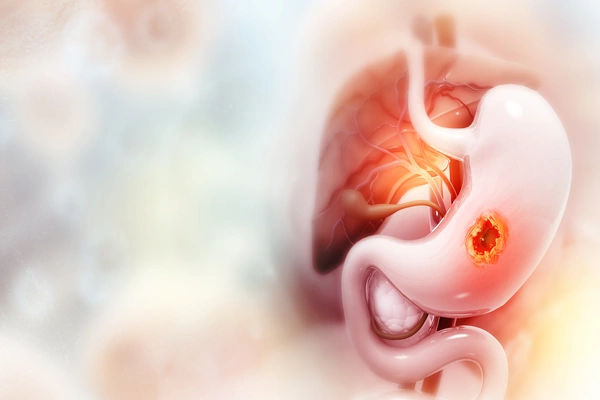Bananas For Stomach Ulcers
Learn how bananas can aid in soothing and healing stomach ulcers with their natural antacid and anti-inflammatory properties. Discover their benefits, nutritional value, and tips for an ulcer-friendly diet.

Written by Dr Sonia Bhatt
Last updated on 13th Jan, 2026
Stomach ulcers, or peptic ulcers, are painful sores that form on the lining of the stomach or the first part of the small intestine. These ulcers are commonly caused by the bacteria Helicobacter pylori (H. pylori) or the excessive use of nonsteroidal anti-inflammatory drugs (NSAIDs). Symptoms of stomach ulcers include burning stomach pain, bloating, heartburn, and nausea. While medical treatment is essential for ulcer management, diet plays a crucial role in both alleviating symptoms and promoting healing.
A well-balanced diet can either exacerbate or alleviate ulcer symptoms. Among the various foods recommended for people with ulcers, bananas have emerged as a particularly soothing and beneficial option. In this article, we will explore how bananas for stomach ulcers can support healing, their nutritional content, and practical ways to incorporate them into your diet.
Why Bananas are a Nutritional Powerhouse for Stomach Health
Bananas are one of the most popular fruits globally, known for their delicious taste, convenience, and numerous health benefits. They are rich in essential nutrients that support overall health, including those that can be beneficial for stomach ulcer sufferers.
Here’s why bananas are considered a nutritional powerhouse for digestive health:
Vitamin C: An antioxidant that helps in the healing of wounds and the maintenance of healthy tissues.
Vitamin B6: Supports brain health and helps in the production of neurotransmitters.
Potassium: Essential for maintaining proper electrolyte balance, supporting heart health, and regulating blood pressure.
Dietary Fibre: Promotes healthy digestion and bowel regularity.
Magnesium: Important for muscle and nerve function, as well as energy production.
These nutrients contribute to your overall health, but bananas also have specific properties that make them particularly effective for soothing the stomach and helping ulcers heal.
How Bananas Help Heal Stomach Ulcers: The Key Benefits Explained
Bananas have long been considered a helpful food for individuals with stomach ulcers, thanks to their unique properties. Here are some ways bananas can contribute to ulcer healing:
1. Natural Antacids: Relieving Acid Reflux and Heartburn
Bananas act as a natural antacid, neutralising stomach acid and providing relief from acid reflux and heartburn. Excessive stomach acid can aggravate ulcer pain, and bananas help to balance this acidity, reducing the discomfort caused by burning pain and reflux.
2. Stimulating Mucilage Production: Protecting the Stomach Lining
Eating bananas stimulates the production of mucilage, a thick, protective substance that coats the stomach lining. This mucilage forms a barrier, preventing stomach acids from coming into direct contact with the ulcerated areas. This protective layer allows the ulcer to heal more effectively, reducing irritation and providing significant pain relief.
3. Anti-inflammatory Properties: Reducing Inflammation and Promoting Healing
Bananas contain bioactive compounds such as flavonoids and antioxidants that reduce inflammation in the stomach lining. Chronic inflammation is one of the main causes of ulcer formation and discomfort. By reducing inflammation, bananas can accelerate the healing process and provide relief from painful symptoms.
4. Prebiotics for Gut Health: Supporting Healing from Within
Bananas are rich in prebiotics—non-digestible fibres that act as food for beneficial gut bacteria. A healthy gut microbiome is essential for maintaining digestive health, and it plays a critical role in ulcer healing. By promoting the growth of beneficial bacteria, bananas help balance the gut flora, supporting the overall healing process and improving digestion.
5. Gentle on the Stomach: Easy to Digest and Soothing
Bananas are naturally easy to digest, making them an ideal food for individuals with stomach ulcers. Their soft texture and mild nature mean they don’t place additional strain on the stomach, unlike many other foods that may irritate or upset sensitive digestive systems. Bananas provide a soothing effect, especially during flare-ups of ulcer symptoms.
6. Rich in Pectin: Aiding Digestion and Reducing Stomach Acidity
Bananas are a great source of pectin, a type of soluble fibre that forms a gel-like substance in the stomach. This gel slows the digestive process and regulates the release of stomach acids, creating a more stable and less acidic environment that is beneficial for ulcer healing.
7. Alkaline Nature: Balancing Stomach Acidity for Healing
Bananas have a naturally alkaline pH, which helps balance stomach acidity. By reducing the overall acidity in the stomach, bananas help create a more conducive environment for ulcer healing. Their alkalinity also counteracts the effects of highly acidic foods and beverages, providing a protective effect for the stomach lining.
How to Include Bananas in Your Ulcer-Friendly Diet
Incorporating bananas into your diet is an easy and effective way to support ulcer healing. Here are some simple ways to enjoy bananas and make them a regular part of your meals:
1. Fresh Bananas as a Snack
Enjoy fresh, ripe bananas as a quick and easy snack or as part of your breakfast. You can slice them and add them to oatmeal, yoghurt, or cereal for a nutritious, soothing meal that’s gentle on the stomach.
2. Banana Smoothies
Blend bananas with ulcer-friendly ingredients like almond milk, oats, and honey to make a delicious, healing smoothie. Avoid adding acidic fruits like citrus that could irritate the stomach. This is a great way to hydrate and nourish your body while soothing your stomach.
3. Banana Porridge
Cook bananas with rice or oatmeal to create a comforting porridge. The soft texture of the bananas, combined with the gentle properties of oatmeal or rice, makes this meal easy on the stomach and ideal for ulcer sufferers.
4. Banana Bread
Make a healthy version of banana bread using whole grain flour, minimal sugar, and nutritious additions like nuts and seeds. This can be a satisfying and ulcer-friendly snack that provides both nourishment and comfort.
5. Banana Pancakes
Create a healthier alternative to traditional pancakes by mashing ripe bananas and mixing them with eggs and a small amount of flour. Cook them on a non-stick pan and serve with a drizzle of honey or a dollop of yoghurt. This easy recipe makes for a comforting and ulcer-friendly breakfast.
Foods to Avoid for Stomach Ulcers
While bananas can provide relief, it's equally important to avoid certain foods that can worsen ulcer symptoms. Here’s a list of foods to avoid:
Spicy Foods: Hot spices like chilli, black pepper, and hot sauces can irritate the stomach lining, exacerbating ulcer pain.
Acidic Foods: Citrus fruits, tomatoes, and vinegar increase stomach acidity and can cause discomfort.
Caffeinated Beverages: Coffee, tea, and cola drinks stimulate acid production in the stomach and should be limited.
Alcohol: Alcohol erodes the stomach lining and delays the healing process.
Fried and Fatty Foods: These are hard to digest and can increase acid production, causing further irritation.
Potential Considerations
Although bananas are generally considered safe and beneficial for most people with stomach ulcers, it's important to recognise that everyone's digestive system is unique. If you are sensitive to bananas or experience discomfort after eating them, it’s best to consult with your healthcare provider or dietitian for personalised dietary advice.
Also, bananas are relatively high in sugar, so those with diabetes or blood sugar concerns should enjoy them in moderation.
Conclusion
Bananas can be a valuable addition to your ulcer-friendly diet. Their natural antacid properties, ability to stimulate mucilage production, and anti-inflammatory effects make them an ideal food for soothing and healing the stomach lining. By incorporating bananas into your daily meals and avoiding foods that can aggravate ulcers, you can support your recovery and reduce ulcer-related discomfort.
However, it’s important to remember that diet is just one part of ulcer management. Always consult with a doctor or dietitian before making any significant changes to your diet, especially if you have a medical condition like stomach ulcers.
Consult Top Gastroenterologist
Consult Top Gastroenterologist

Dr. Chethan T L
General Physician/ Internal Medicine Specialist
5 Years • MBBS, MD, DNB (General Medicine)
Bengaluru
Apollo Medical Center, Marathahalli, Bengaluru

Dr. Pavan Kumar Y M
Gastroenterology/gi Medicine Specialist
5 Years • MBBS, MD Medicine, DM Gastroenterology
Bengaluru
Apollo Medical Center, Marathahalli, Bengaluru

Dr. Jatin Yegurla
Gastroenterology/gi Medicine Specialist
11 Years • MD (PGI), DM (AIIMS Delhi), FAGIE (AIIMS Delhi), ESEGH (UK), Gold Medalist
Hyderabad
Apollo Hospitals Jubilee Hills, Hyderabad
(675+ Patients)

Dr. Amit Pandita
Gastroenterology/gi Medicine Specialist
10 Years • MBBS. MD (INTERNAL MEDICINE) DrNB (GASTROENTEROLOGY AND HEPATOLOGY)
Delhi
Apollo Hospitals Indraprastha, Delhi

Dr Piyush Vishwakarma
Gastroenterology/gi Medicine Specialist
11 Years • MBBS, MD, DrNB,
Delhi
Apollo Hospitals Indraprastha, Delhi

